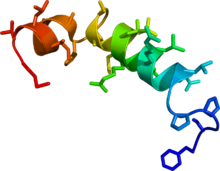
Euan Ashley and his colleagues discovered an association between heart failure and a pathway linked to narcolepsy. Mark Tuschman
The gene identified by Stanford researchers codes for a protein first identified when a mutated form was shown to cause narcolepsy.
Caring for patients with heart failure costs the US $40 billion a year. Few new treatments have been developed, and those that exist produce varied responses among patients. One major challenge to the development of new treatments has been the lack of genes that can be confidently associated with heart failure. Prof. Euan Ashley is hopeful that the new finding will open doors to evaluating possible treatments.

orexin (hypocretin) neuropeptide precursor
Perez wondered if there were genetic reasons for discrepancies in treatment outcomes observed in the study. He suspected genetic variation in the study’s patient group might point toward a link. The team genotyped heart-failure patients at the extremes of responses – those who had the best and worst responses to therapy. They combined these results with gene expression data from human cardiac tissue available from a large, publicly accessible data set. By combining a variety of approaches including network modeling, which looks at the relationship between genes, the team searched for genetic variants associated with heart health.
They found a gene near the region coding for orexin receptor protein, involved in control of sleep, appetite and BP and via experiments, they concluded the gene likely regulates how much of the receptor is made in a cell. They also found its expression was increased in diseased human heart tissue. Using a mouse model that mimics heart failure through artificially elevated levels of adrenaline, the researchers examined the role of the receptor and orexin. They found that if they gave orexin to the mice with failing hearts, those mice showed better systolic heart function than did mice that did not receive orexin.
Ultrasounds of the hearts in a different group of mice, which were missing the orexin receptor, showed that these mice had greater diastolic heart dysfunction, another hint suggesting that the receptor is important for healthy hearts.
“The exciting thing is that this gene is in a completely different neurohormonal axis – a completely different pathway than what has been looked at previously,” Perez said. In fact, the finding has raised the question of whether insomnia medications that work by blocking the function of the orexin receptor could harm the heart, although this has not yet been studied, Perez said. “We already know that sleep apnea is bad for the heart,” said Ashley. “One of the things we are now hoping to do is look at heart function in patients with narcolepsy.”








Recent Comments